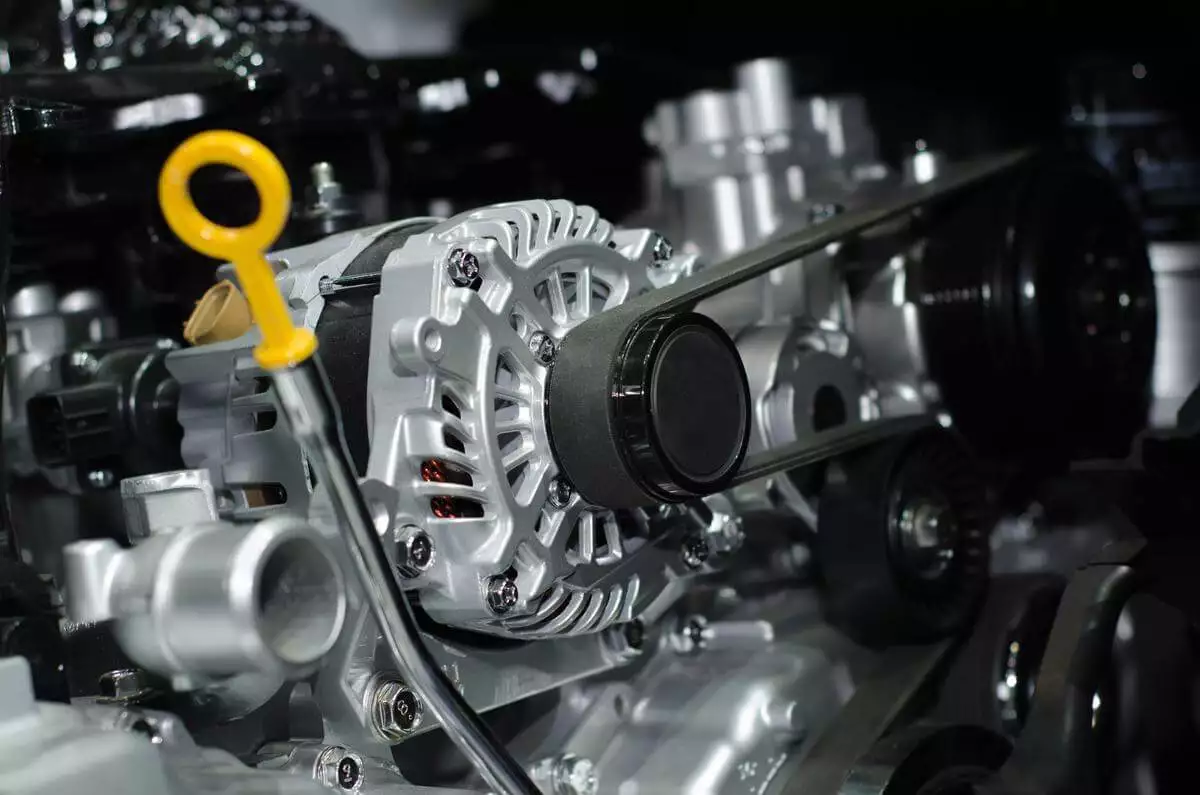Have you ever found yourself stranded on the side of the road, anxiously staring at your vehicle with a sinking feeling in your gut? The engine refuses to come to life, or the lights keep pulsating and dimming, or the radio keeps turning off? This leaves you frustrated and wondering what could have gone wrong.
It’s a situation most drivers dread, and it often leads to a common question: How long does an alternator last?
We understand the frustration of a dying alternator. Therefore, we have compiled this article that will answer some of the questions plaguing you.
What Is An Alternator?
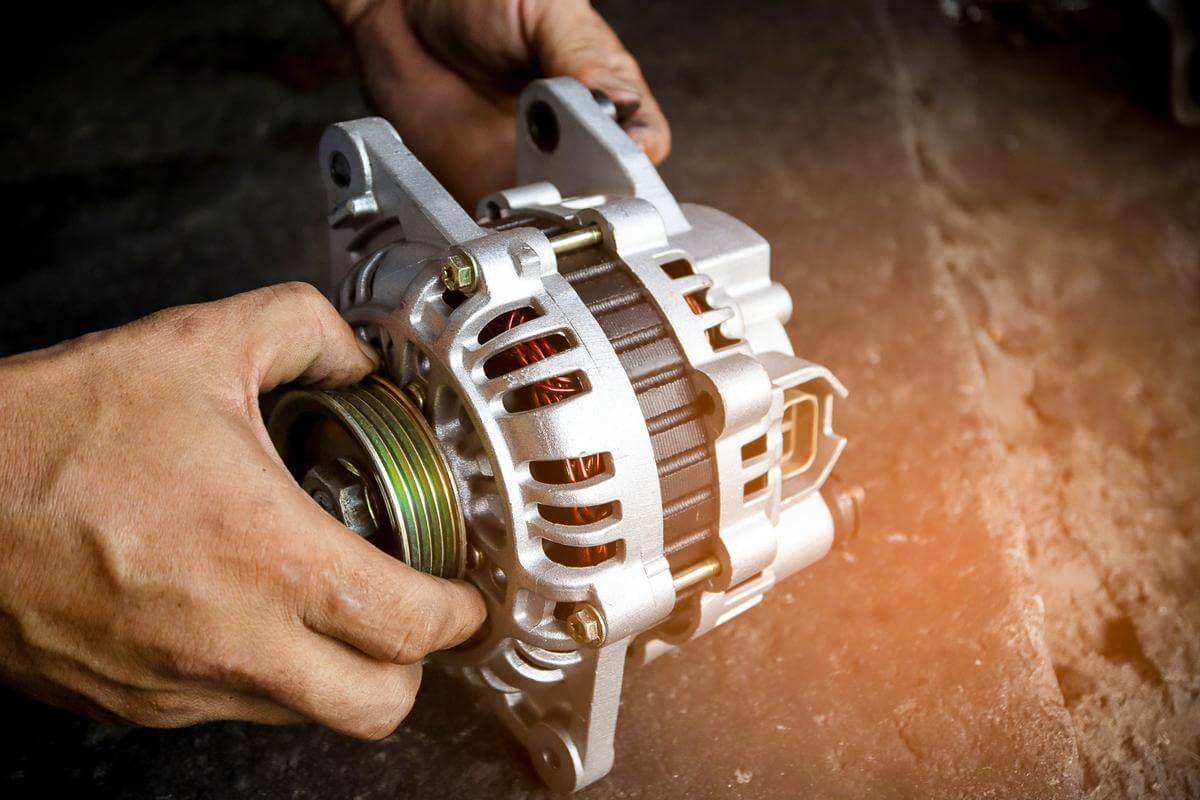
It doesn’t matter if you have a new or an old car or are a seasoned driver or a novice, you are always asking yourself, “What could go wrong?” And the alternator is a common problem area in your car.
But what is an alternator anyway? An alternator is an essential component of a vehicle’s charging system. It is an electrical generator that converts mechanical energy into electrical energy.
But, its role goes beyond simply recharging the battery. The alternator is responsible for supplying power to the various electrical systems in your vehicle, such as the headlights, interior lights, power windows, audio system, and other parts. It also powers the ignition system, ensuring a smooth start for your engine.
The way an alternator works is quite fascinating. As the engine runs, the crankshaft turns a pulley connected to the alternator through a belt. This rotational motion induces a magnetic field within the alternator, which in turn generates an alternating current (AC).
The AC is then converted into a direct current (DC) through a voltage regulator and goes to the car’s battery.
Essentially, the alternator acts as the electrical powerhouse of your vehicle, ensuring a steady supply of electricity to keep everything running smoothly. Without a functioning alternator, the battery’s charge would quickly deplete. This will lead to a loss of power.
Where To Find The Alternator In Your Car?
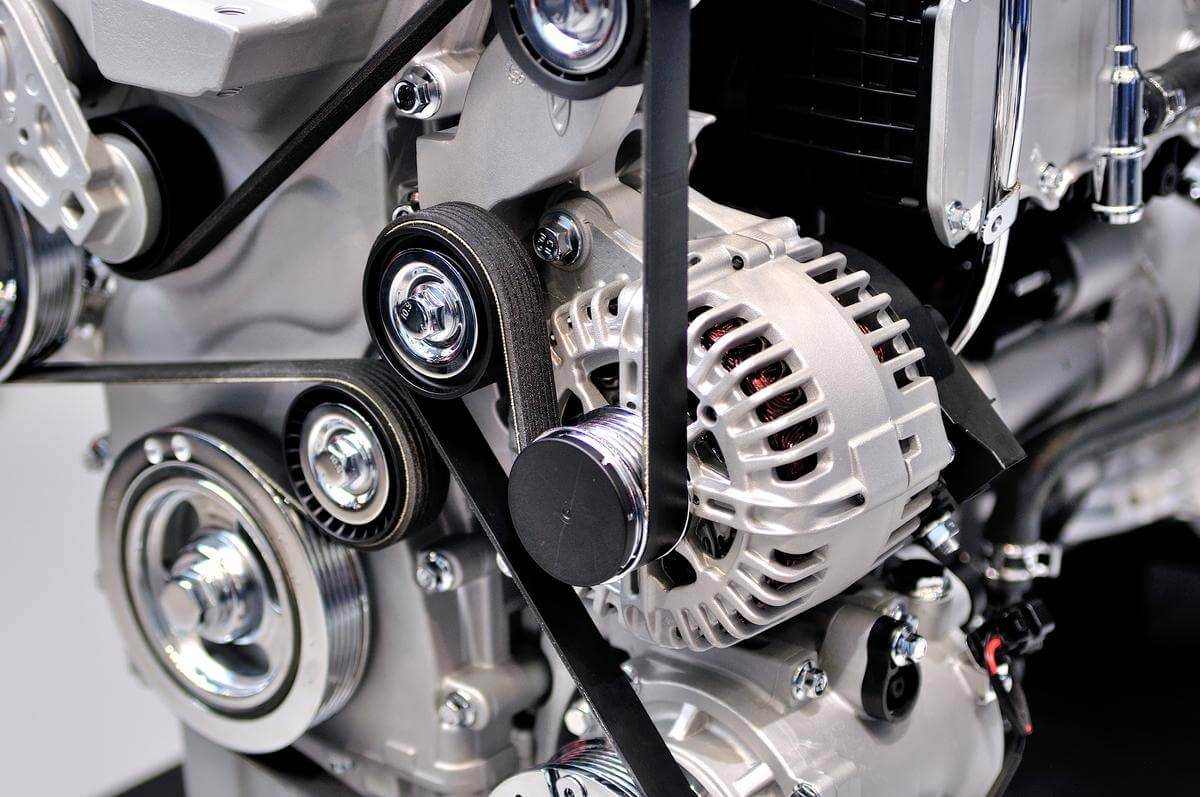
The location of the alternator can vary depending on the make and model of the vehicle. However, in most cases, the alternator is located near the front of the engine, typically on one side.
To locate the alternator, you can follow the path of the drive belt. The alternator will have electrical connections, such as a large positive cable and a smaller wire for voltage regulation, which are easily identifiable.
How Long Does An Alternator Last?
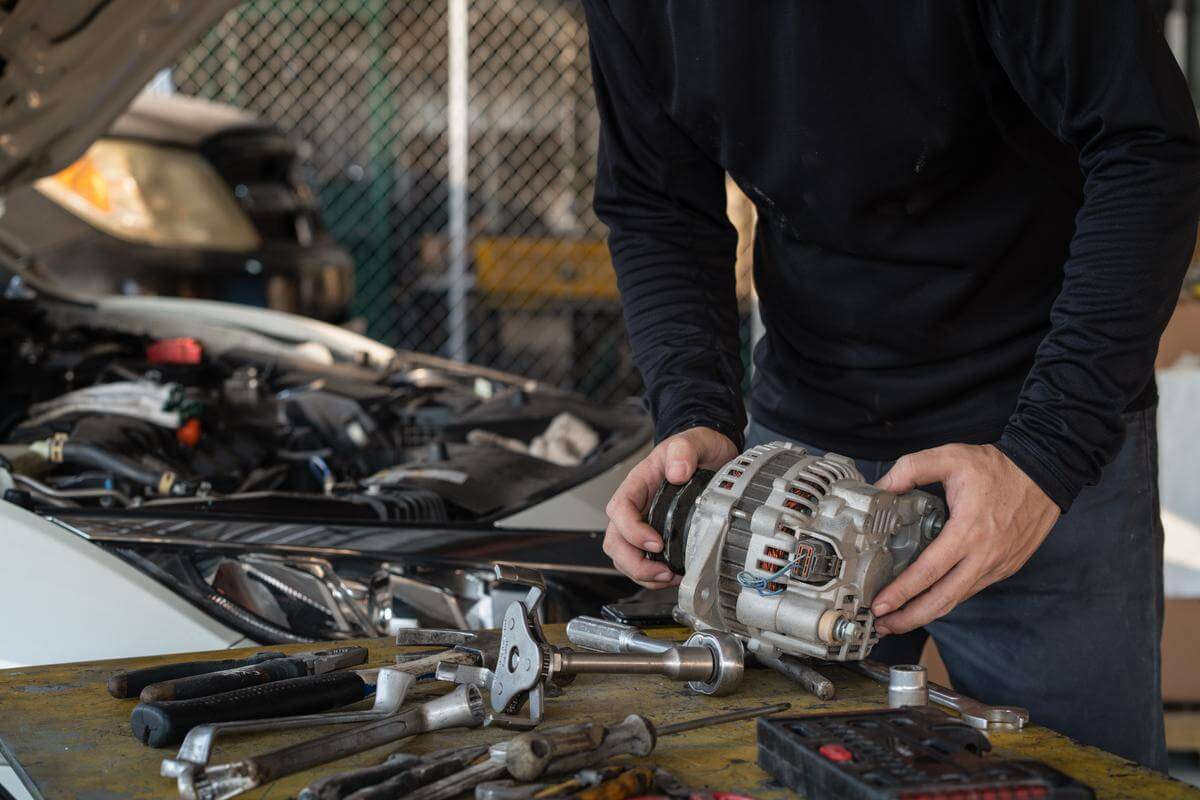
Before we answer this question, it is important to understand that there is no single answer to this. The lifespan of your alternator depends on multiple factors, like the quality of the alternator, driving conditions, maintenance, etc.
Alternators typically last around seven years or 150,000 miles (240,000 kilometers). So, you might need to get your car a new alternator every seven years. The price of an alternator depends, but it is usually anywhere between $200 and $1,000. Here is an option you can check out.
But, like most things, you can do certain things to make your alternator last longer. Regular maintenance of your car can certainly help in increasing the longevity of your alternator. For instance, try to have a limited number of appliances in your vehicle, address fluid leaks right away, maintain proper belt tension, and keep battery terminals clean.
What Causes An Alternator To Go Bad?
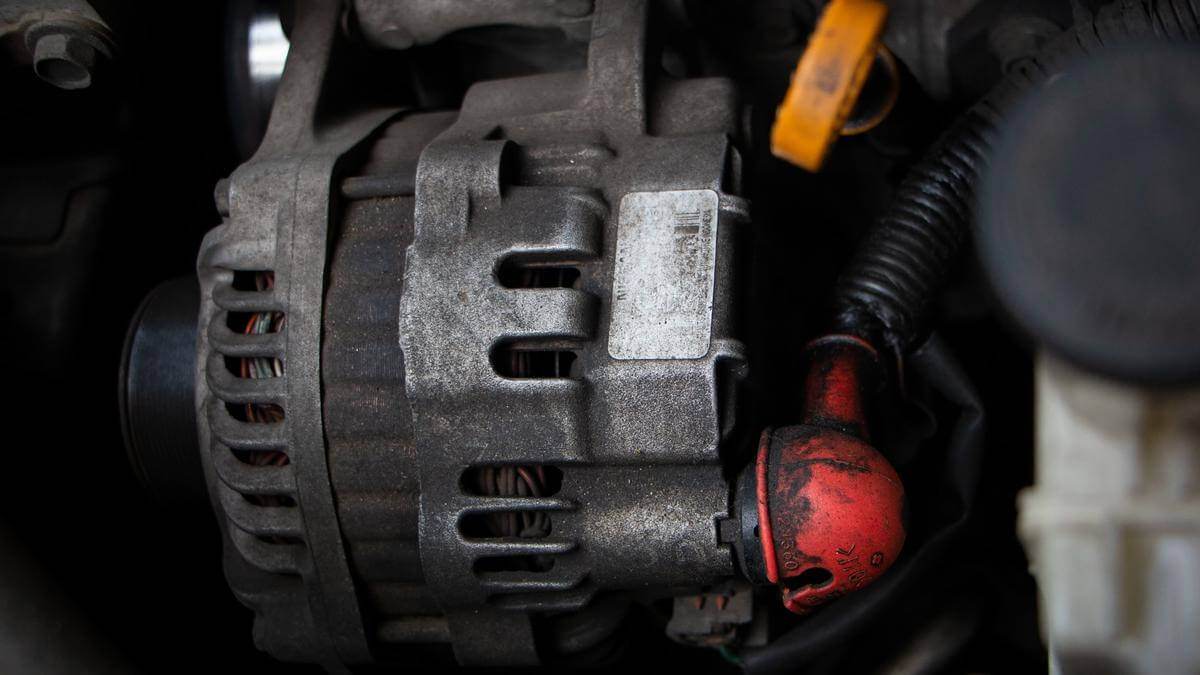
There is no concrete answer to this question, but the most obvious answer is lack of maintenance. If you don’t replace the serpentine belt or check the performance of the battery regularly, chances are that your alternator will die sooner.
Apart from this, excessive heat is also another cause. Overloading, that is, using too many accessories can also cause damage to your alternator.
How To Know When To Replace Your Alternator?
Your alternator does not just give up randomly. Before it gives out, it offers you certain symptoms or indicators that will help you understand that your alternator is failing. That is why we have created a list of certain signs that indicate a dying alternator. These include:
1. Battery Warning Light
If your battery warning light comes on while you are driving, it is a sign that something might be wrong with your alternator. Other times, instead of staying on, the light may also flicker. Either way, you should get your alternator checked out.
2. Noises
Strange noises coming from your car are seldom a positive sign. A dying alternator will produce metallic whirring or grinding sounds. You are most likely to hear these sounds immediately after you start your car. A worn belt can produce odd noises, and result in a bad alternator. In such cases, you can also try replacing the belt instead of the whole alternator.
3. Headlight Problems
Inconsistent or dim headlights are another good indicator of a bad alternator. Dim headlights mean that the alternator is failing to send enough power to the lights to shine as brightly. The headlights sometimes just keep on flickering (turning on and off). This can be a hindrance and requires you to check out the alternator. The interior lights also sometimes do the same.
4. Engine Stalling
Imagine you are going to the grocery store, and your engine gives up on you. Your car won’t start. Such a situation has probably occurred because your alternator failed to charge your battery.
5. Accessory Failure
Imagine you are grooving to a rocking song and your radio stops. Or, the windshield wipers refuse to work. Or, your phone isn’t charging, no matter what you try. These are all giveaways that your alternator is failing. However, note that it is only the case of a bad alternator when multiple accessories are acting up. If it is just one accessory not working, it is probably some other issue that needs your attention.
6. Dead Battery
You wake up one morning ready to start your day, and as soon as you start your vehicle, you find you have a dead battery. You think to yourself it’s not a biggie and you can simply replace your battery. But, even after you replace your battery, you find it dead again the next morning. This happens because the issue is not with your battery but with your alternator. It doesn’t matter if you buy the best quality battery, it just won’t work if your alternator is failing. This is because the alternator is responsible for recharging the battery.
How To Tell The Difference Between A Bad Battery And A Bad Alternator?
It is difficult to diagnose the exact issue sometimes since the indicators of a bad alternator and a bad battery overlap. That being said, there are some easy ways to tell the difference.
Difficulty Starting The Engine
While both a bad battery and a bad alternator can cause starting problems, if you experience trouble starting your vehicle after it has been running, it is more likely an alternator issue. The alternator should recharge the battery while the engine is running, so a failing alternator may not provide sufficient charge to start the engine. To understand which component is at fault, jumpstart your car with a set of jumper cables. Loosen the positive battery cable. If the car keeps running, chances are that the issue lies with the alternator, and if the car stops running, it is more likely the battery.
Accessories Not Working
If multiple accessories in your car keep failing one after the other, it is more likely a bad alternator. The alternator is responsible for providing power to these electrical components, so if they are not working, then there is an issue with the alternator.
The bottom line is it is not always easy to diagnose the real culprit. If you are not sure of what the actual problem is, it is best to contact a mechanic.
How To Maintain Your Alternator?
We have briefly talked about the importance of maintaining your alternator. It ensures that the alternator lasts longer, and you won’t have to spend money frequently. Let us take a look at some ways through which you can maintain your alternator:
1. Charge devices individually: Your alternator is responsible for providing electrical power. When you charge too many devices at the same time, you are putting a lot of pressure on your alternator. Hence, a good idea is to take turns. Don’t overburden the alternator, and take out the cables once you are done charging.
2. Address fluid leaks: Leaks in your car are never a good sign, but if the leakage goes down to your alternator, it is even worse news. Look out for a gasket leak around your engine. Contact a trusted mechanic and have them fix the issue right away.
3. Don’t idle for too long: When you are waiting somewhere, it is best to turn off your car. If you keep on running the accessories in your car, it will drain the battery. This, in turn, causes the alternator to go bad since it is under a lot of pressure to charge the battery back up again.
FAQs About Alternators
We have narrowed down a few common questions you may have regarding alternators.
1. Can I replace the alternator myself or do I need a professional?
It is not impossible to replace a bad alternator yourself. As long as you have the correct tools for it, it can be a fairly simple process. That being said, it might be best if you consult a professional.
If you are not well-versed in the mechanics of a car, your alternator or any other part may fail again. Alternatively, a professional has the expertise, tools, and knowledge to properly diagnose the issue, recommend the right replacement alternator, and ensure the installation is done correctly.
2. How often should I have my alternator inspected or tested?
While an alternator typically lasts for about seven years, you can have it checked frequently to ensure that it is working properly and that there is no impending damage. Follow the maintenance schedule recommended by your car’s manufacturer.
When you have the battery checked or serviced, ask the mechanic to inspect the alternator as well. Furthermore, if you are experiencing any of the signs mentioned above, it is a good idea to have your alternator checked right away.
3. Can a bad alternator drain the battery?
Yes, a bad alternator can drain the battery. The alternator plays an important role in charging the battery while the engine is running. If the alternator is not working correctly, it may not be able to properly charge the battery, leading to its gradual depletion.
Therefore, if you wish to increase the battery life too, it is important to ensure the performance of the alternator.
4. What should I do if my alternator fails while driving?
A lot of drivers assume that a failed alternator is not that big of an issue, since it doesn’t directly affect the engine of your car. However, it does affect the battery, which in turn, affects the engine. If you experience a failed alternator while driving, it is best if you pull over and call for assistance.
Once you have safely pulled over, turn off any non-essential electrical components, like the air conditioning, radio, or interior lights. This can help preserve the remaining charge in your battery. If you have a bit of charge left, take your car to a repair facility. But, if your battery has completely given out, call up a mechanic.
Conclusion
We hope we have been able to help you understand how to recognize an alternator problem. While alternators last a considerable amount of time, they need proper maintenance and replacement, just like most things in your car. As a rule of thumb, it is good to look into it every seven years or so.
But what should you do when you think your alternator is failing?
- Contact a trusted mechanic to look into the issue.
- Try to figure out if it is your battery that needs a replacement or your alternator.
- Take proper care of your alternator, and do not put too much pressure on it.
If you have any further questions, don’t hesitate to leave a comment below! We will be happy to help you with any queries you may have.
Images credit: shutterstock.com

